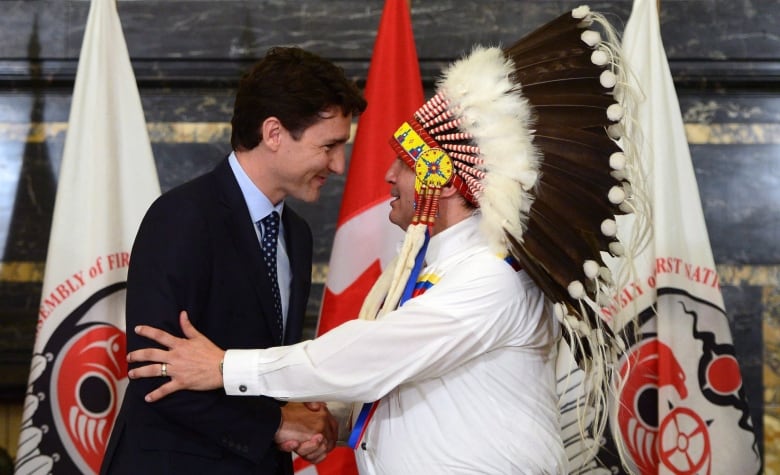Chris Hall: Bellegarde says Indigenous people need 'allies' - and blockades don't help
'I get it. You don’t build allies when people are inconvenienced,' says AFN chief


For weeks, supporters of the Wet'suwet'en hereditary chiefs blocked rail lines and demonstrated on the steps of the B.C. legislature, many of them holding signs declaring that "reconciliation is dead."
Their anger, directed at a natural gas line through unceded territory in northern B.C., turned into a rallying cry for Indigenous title and governance — for control over land.
Perry Bellegarde has heard their voices. But the national chief of the Assembly of First Nations insists reconciliation is far from dead.
"Reconciliation is hard. It's not going to happen overnight," Bellegarde said in an interview airing today on CBC's The House. "Canadians can't give up on it. First Nations can't give up on reconciliation. We can't give up on hope, on building a better country together."
Prime Minister Justin Trudeau makes much the same argument. He's committed his government to working to resolve land claims, to consulting with Indigenous communities on resource projects and to enshrining the United Nations Declaration of Indigenous People into Canadian law.
At the same time, he and his cabinet ministers insist those commitments don't give Indigenous people a veto over projects on their territory.

The question for Bellegarde and the other elected chiefs representing the 634 First Nation communities in Canada is whether their people are listening to them any more than they're listening to federal and provincial politicians.
"I hope so," Bellegarde said when asked why the blockades continued even after he and other chiefs called for them to end in mid-February. "I believe we've had [an] impact."
He pointed to the Liberal government's speech from the throne last fall — which set out an entire chapter titled "Walking the Road of Reconciliation" — as a sign of the progress national Indigenous organizations like the AFN are pursuing.
Still, progress is slow. Patience is not always a virtue. Support for the hereditary chiefs raises questions about who really speaks for Indigenous communities.
The blockades, Bellegarde said, pose a challenge to efforts to build support across Canada for respecting Indigenous rights and title, and to convincing governments of the importance of investing in housing, water and infrastructure in First Nations communities.
"We need allies. And I get it. You don't build allies when people are inconvenienced."
Bellegarde's predecessor as national chief, Shawn Atleo, resigned after the Idle No More protests in early 2013. He was accused of being too willing to work with then prime minister Stephen Harper.

Bellegarde knows he faces similar accusations of being too close to Trudeau and the premiers. He said it goes with the job of being national chief of the AFN.
"You have to be able to open doors and have access to those people," he said. "Because if you don't … how are you going to bring about policy and legislative change? Through a blockade? No. Through going to the Supreme Court of Canada which takes 25 years? That takes too darn long."
Bellegarde and the leaders of the three other national Indigenous organizations are to sit down with Trudeau and the premiers on Thursday, a day before the first ministers hold their meeting in Ottawa.
The Wet'suwet'en solidarity movement and the blockades almost certainly will be raised by the premiers. It's possible they'll express concerns about whether the blockades might return. Bellegarde said he has his answer already — especially for the premiers.
"I will tell them, 'What you should be doing as premiers [is to] embrace the UN Declaration on the Rights of Indigenous People. Really embrace treaty implementation,'" he said.
"It's all about sharing the land and the resource wealth. It's all about peaceful coexistence and mutual respect."